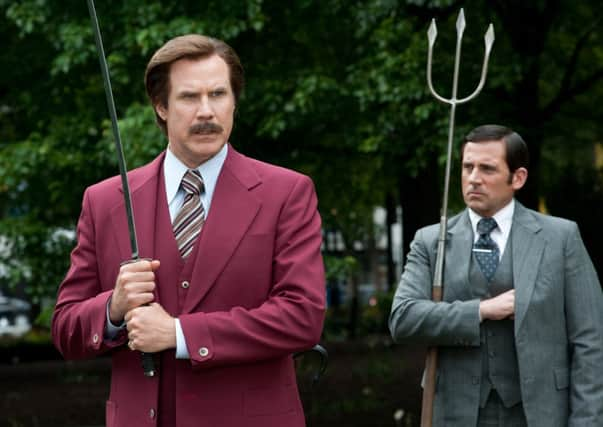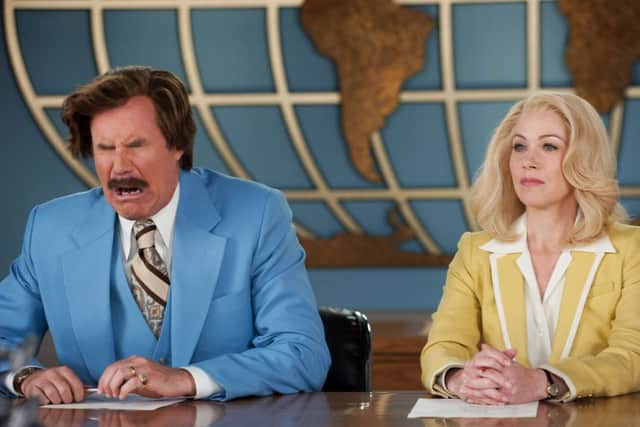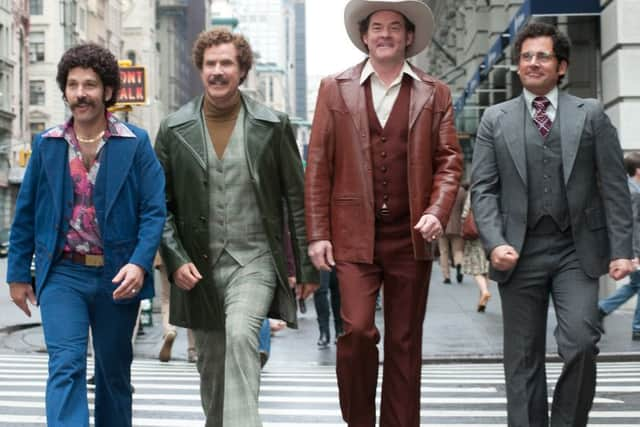Interview: The cast of Anchorman 2


In 2004, Will Ferrell’s signature film was an absurdist tribute to television newsmaking in the 1970s. Now Anchorman 2: The Legend Continues revisits big-haired, small-brained newscaster Ron Burgundy as he kickstarts the dumbing down of 24 hour news channels in the 1980s.
Ferrell has a field day improvising on Ron’s inability to deal with workplace conflict, racial differences and actual news. “Why can’t we just tell people what they want to hear?” he complains, inadvertently predicting the future of TV news.
Advertisement
Hide AdJoining Ron back on the newsbeat are his old team of roving reporter Brian Fantana (Paul Rudd), weather man Brick Tamland (Steve Carell) and capable Veronica Corningstone (Christina Applegate), along with Harrison Ford as a trusted newsman Mack Hark.


Q. Is there a real-life Anchorman that resembles Ron?
Will Ferrell: There’s a lot of Rons out there in local news. And he’s kind of based on a bunch of different guys. It’s definitely a thing in the States. Everyone growing up has that local news person they watched. And when you think about it, before cable they were huge celebrities. They were the person that if you saw them at a restaurant you’d want to go and get their autograph.
Q. Do you have friends who work in television journalism?
Paul Rudd: I know some people that do and I feel as if news journalists and anchors have a special kind of relationship with this movie. Whenever we go to talk to any kind of news outlet, inevitably they’ll tell us: “We have a Ron here.” Or: “He’s our Brick.” Or: “He’s our Champ.” It’s also been interesting to see it evolve because when the first one came out, some people really liked it but I remember from other news anchors that they weren’t so keen on it. It was more like: “Nice try but it’s not what it’s really like.” I remember one person said: “You really missed an opportunity to really satirise something that could use some satirising.”


Q. How was it returning to these characters after so long? Did it come easily again?
Steve Carell: It was kind of emotional when we all first put on our stuff and looked at each other because it had been so long since we’d been in these characters. You rarely get the chance to revisit a character like that and see your buddies dressed up. It was almost like going to a costume party that day. We were just excited and kind of giddy about it. The first week was a little touch and go for me, only because I didn’t want to do an impression of what I had done the first time.
How did it feel returning to play anchor and apple of Ron’s eye, Veronica?
Advertisement
Hide AdChristina Applegate: Incredibly comfortable. I felt like it was my second skin. But when we finally got on set I started to get really nervous that I had lost who she was because she had changed so much, so it wasn’t the same skin I was wearing. She’s 10 years older, she’s a mother, she’s highly successful, she’s achieved so much and that starts to change a person - especially being a mum. It changes your priorities and your drive.
In the first one, Veronica’s whole motive is power. In this one, I felt innately softer because she really wanted love. Everything about her felt softer, which I liked because it was a nice change.
Q. Did you ever think Anchorman 2 might not happen?
Advertisement
Hide AdSteve Carell: It was a surprise that it did happen. When the movie first came out it wasn’t a hit. It didn’t warrant a sequel. So, it was only after so many years that there was even a consideration of that happening. And then I don’t think the studio was necessarily that interested because I don’t think financially it made sense to them. Will [Ferrell] and Adam approached them with various ideas, one of which was a musical version. We would write a musical, take it to Broadway, perform that for six months or so and then segue way into shooting a film after that. So, that was the original pitch and they could not have been less interested.
Q. Would you have done that?
Paul Rudd: Oh yeah, we were all on board.
Q There’s a very uncomfortable dinner party where Ron insults a black family with some outrageously ignorant and racist remarks - how do you balance that in comedy?
Will Ferrell: I made a speech to all the actors at that table beforehand and said ‘I apologise for everything that Ron Burgundy is about to say, please know this is all in jest and comes from a naive place’. All of the actors said ‘of course, we totally get the joke’. The bizarre thing about that scene and, I think, why you can laugh at it, is Ron thinks he is helping, that he is really communicating with the room. But he has no idea what he’s doing and subsequently gets beaten up, as he should.”
Q. How are you at keeping a straight face during takes?
Christina Applegate: It’s not easy. On the first one, I was proud of myself because for 90 per cent of the time I did keep it together and remained professional. On this one, I don’t know what went wrong – I ruined a lot of takes.
There’s a very structured script and very structured jokes and a lot of that is still in the movie. But we do one or two passes as written and then it’s a free-for-all. And that free-for-all can go on for an hour of improvisation in the same scene. So, they have different versions of this movie with completely different dialogue. I think it’s going to be on the DVD. They’re making a whole new movie – or rather, same movie and same plot but completely different dialogue.
Q. There is a serious message in the film as well about the slipping of news standards. What’s your view on that?
Advertisement
Hide AdWill Ferrell: Well, when we decided to pick 1980 and the beginning of 24-hour news, it felt like you kind of had to go there with doing a little bit of a satirical view of what news is now. I think there’s a lot of conflicts with the 24-hour news cycle. It’s hard to fill that time. So, what happens is long stretches of talking heads going: “Well, I think this!”; “Wrong, I think this!” And that leads to speculation, which in a weird way then leads to everyone having separate camps.
Q. Was that part of what attracted you to the script, that there was more to it than meets the eye?
Advertisement
Hide AdChristina Applegate: I didn’t even see a script. I didn’t care. I was going to be in this movie. For the first one, at least, I loved the fact that they were exploring that the newsrooms were so misogynistic and these women really did have to fight for their life. It wasn’t a bunch of women whining that they’re not being treated with equality - they literally were treated as pieces of meat and were not taken seriously.
Q. Is it any easier being a woman in Hollywood?
Christina Applegate: I think it still exists. I think the gender thing exists. But no one says anything. It’s there. You can feel it. It is a boys’ club and as women we know that. They don’t realise it. But we feel it. Not with these guys. These guys are really all-inclusive with everyone. But in Hollywood it does feel a bit like a boys’ club. It’s in the scripts. It’s in the decision making and how we’re treated if we have an opinion about things. Not to get it too serious in here but people don’t want to hear that we’re displeased with something because we’re women and now we’re just complaining as opposed to trying to solve an issue in a script or an issue in a show.
Q. How was sharing a scene with Harrison Ford, and so close to Harrison Ford’s face?
Will Ferrell: Harrison Ford inches away from your face is both thrilling and frightening. I couldn’t believe he was so relaxed and was willing to play along
It’s a sidestep if you’re used to working in a conventional way, even though everyone is totally nice and we can’t reiterate enough times, ‘don’t worry, you literally don’t have to be funny, just say whatever feels and comes naturally and it’ll usually land on its feet’.
Here you have Adam the director yelling lines at you while the camera is rolling. Once you get used to it, it’s really freeing. You just learn to kind of take it in.
Advertisement
Hide AdHarrison Ford just kind of jumped right in. If I had stopped to consciously think about what was happening, I probably would have left the room. I would have been so intimidated. But it was hilarious.
And Kirsten Dunst is a hell of an actor but asked us: “Can I just come and do something?” And we said, “Sure, do you want to blow a trumpet on top of a 15-storey building?” And she said “OK”.
Q. Did they get paid?
Will Ferrell: They got paid in coupons, yeah!
Q. Is there a lot of testosterone on an Anchorman set?
Advertisement
Hide AdChristina Applegate: Actually, they’re kind of the most fey kind of guys I’ve ever met in my entire life [laughs]. They’re soft. They’re not sports and burp and… they’re these incredible family men. Most of them are pretty soft spoken. They’re not zany. They save that really for on-camera, except when everyone gets together and everyone gets silly and ribs each other I probably have more manly qualities than they do as far as my sense of humour and as far as my behaviour.
Q. What would be the most memorable news event of your life?
Will Ferrell: Outside of 9/11 would probably be the night that John Stamos won Dancing With The Stars. You heard people cheering.
Q. What are your memories of the ‘80s? Did you have a perm?
Steve Carell: No, not on my head.
Paul Rudd: You permed your legs.
Steve Carell: And do you know what? I won so many tennis matches just because of that. People were so astounded.
Paul Rudd: I didn’t have to perm my hair in the ‘80s because as soon as puberty hit me my hair just went pring – it was everything. I was spotty, I had curly hair, and I really fought it. I was used to going with the kind of feathered back Colt 45 look. And so I would fight it with the hairdryer and it looked horrible.
Advertisement
Hide AdSteve Carell: I had a moustache from high school through a good part of college. I thought it made me look more formidable as an athlete. I thought it looked more intimidating.
Paul Rudd: The high school moustache is a bold choice! The ironic moustache didn’t exist back then. Did any of the other kids have a moustache in high school?
Advertisement
Hide AdSteve Carell: I think there was one or two. One girl… one junior.
Paul Rudd: I liked the ‘80s fashion. I embraced it whole-heartedly. I remember – and I was living in the Mid West, in Kansas City, where it wasn’t the easiest to get your hands on the latest fashions – going over to my friend Jeff’s house after school I had on this outfit black pleated pants, there also might have been pleats in the ass, which is an interesting statement. Plus a black shirt with grey sleeves, a pink tie, pink piping on all of the seams, pink socks and black dress shoes.
Jeff’s mum said, “You look amazing! I love your outfit!”
I thanked her and she said: “Did you wear that to school today?”
And I said ‘yeah’ and she said: “Was it space day?”
Steve Carell: Did you back off of the pink piping after that?
Paul Rudd: No. I remember I wore my mum’s gold pants.
Q. Can we expect Anchorman 3?
Will Ferrell: Boy, I don’t know. We’re just going to see what happens with this one. Yeah, it’s so fascinating how quickly that question gets asked without it even being in theatres yet.